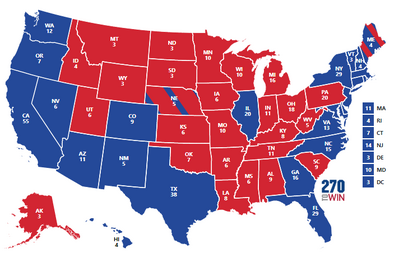The 2028 presidential election represented one of the biggest electoral shifts in American history. Following the 2020-2021 coronavirus-induced recession, most people were eager for bold, new change. Joe Biden defeated Trump in the 2020 election, narrowly winning back Michigan, Pennsylvania, North Carolina, and Florida from Trump. He also won Arizona, becoming the first Democrat since Bill Clinton to do so. However, 3 months into his presidential term, he was diagnosed with dementia. To make matters worse, his administration tried to cover up the medical reports. However, a whistle-blower leaked it to the New York Times. Biden had no choice but to resign, and his VP, Kamala Harris, took over. Biden died of heart failure 2 years later.
The economy recovered during her presidency, and she sailed into reelection over former VP Mike Pence and his running mate, Nikki Haley in 2024. She won all the states Biden won four years previously, as well as Wisconsin, North Carolina and Georgia. However, the 2026 midterms were disastrous for Democrats in the north; Republicans won back many Democratic House and several Senate seats in Pennsylvania, Michigan, Wisconsin, and Minnesota.
Due to a provision in the 22nd Amendment, Kamala Harris was ineligible to run again in 2028 despite serving less than 8 years. The president can only serve two terms and can serve a meximum of 10 years. This never came into play except in 1968 when Lyndon Johnson could have served three seperate terms as president had he decided to run again and win.
After tense and competitive primaries, Stacey Abrams emerged as the Democratic front-runner and got the nomination. She picked Beto O'Rourke, a fellow southerner, to be her running-mate. Republicans nominated Donald Trump jr to be their nominee, and he picked Senator Tom Cotton of Arkansas to be his running-mate. Abrams platform included massive investments in new technologies for border security, sweeping tax cuts for the middle class and the poor, a plan to gradually end the coal industry and help states adapt to clean energy policies, a plan to track every gun in America to reduce the number of illegal guns in the streets, a reduction of nuclear arms across the globe, and national healthcare system that leaves private insurers intact. Nonetheless, Trump jr attacked her as being an open-borders socialist whose policies would destroy America. Trump jr proposed the "resumption" of the "border wall", huge tax cuts for the wealthy, massive increases in defense spending, and the elimination of every environmental regulation on the fossil fuel industry.
The candidates' attacks against each other were nasty and ugly, to say the least. Abrams criticized Trump jr for not caring about the environment and for his proposals to spend money recklessly. She pointed out that it is legally impossible to build a wall along the southern border, even if Democrats were to agree to it. She also cited his father's poor response to the Coronavirus pandemic 8 years earlier and how it led to a recession. Trump jr denied all these attacks and continued to insist that she supported open borders and huge tax increases.
The pundits were unsure about who would win. Abrams was building momentum in Georgia and Texas, but Trump jr had an advantage in the midwest that could offset a blue Texas. However, by election day, most organizations predicted that Abrams would win, and they were all correct. As seen on the map below, the 2028 election showed the massive party realignment. Trump jr won the entire midwest, except for Illinois, but Abrams won the entire southwest in addition to west and east coasts. Thus, Abrams became the first Democrat since Woodrow Wilson in 1916 to win the election without carrying a single state in the "blue wall" of Minnesota, Wisconsin, Michigan, and Pennsylvania. However, Abrams became the first Democrat since Jimmy Carter in 1976 to win the state of Texas; Trump and Pence, respectively, narrowly won the state in 2020 and 2024. Abrams also considerably narrowed the Republican margins of victory in Montana, Kansas, South Carolina, and even Utah.

